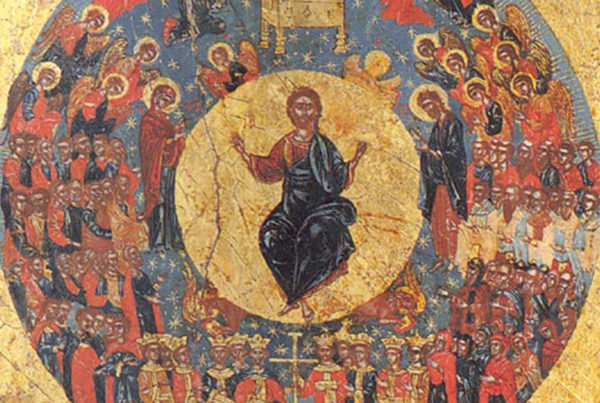The way some people talk about growth in resurrection life, you’d think it all happens in a day.
When I was a kid, from time to time, traveling preachers would come to our church to talk about all the amazing things that God was doing through their ministries. The stories they told about how they got their start in these ministries always had a familiar ring to them; predictable narrative patterns dripping with a sense of the fantastic and legendary.
I remember how it all began… I was just an ordinary person, like many of you sitting here today (ahem)… One week I decided to fast and pray… It was in the fifth day of this, around 3:00 in the afternoon… I’d been praying all day… when Jesus met me and called me… my life was totally changed, and within six months I was preaching to crowds of many hundreds of thousands in India…
Or something very much like that.
I don’t doubt that there was a core of truth in the stories of most if not all of those preachers. The trouble is, it seems to me, that the myopic preoccupation with the fantastical had the tendency to obscure the way that growth in resurrection life, a genuine day-to-day partnership with the life of the age to come actually works.
Yesterday I preached my final Easter message for our congregation here in Denver, Bloom. My goodness what a ride it has been, and what a magical day it was yesterday. Several hundred folks across both of our services, baptisms, tenderness, laughter, communion, prayer and praise and hearty choruses of “Crown him with Many Crowns” and a spirit of levity and joy in the room. It was amazing. I thought, “If I had to come up with a dream scenario for a last Easter with this community–heart of my very heart–it would look something like this.”
It was fun to be part of all of that yesterday and to compare it with Bloom’s humble beginnings. 50-75 or so folks gathered on Sunday nights in the theater at the Grant Avenue Community Center. I thought about all those Sundays early on when Bloom would gather and we’d have a nice time and then Monday would happen, and without a building or offices or a phone number or an email address, I wake up on Mondays and spend most of the week wondering where the community went, if it still existed at all. It was a supreme act of faith most weeks to believe that our little church didn’t just vanish into the ether when the service was over.
I always expected that at some point (soon, I usually thought) Bloom would hit its stride, the first of many obvious and visible growth spurts would take place, and the inexorable march to church awesomeness would begin. It never did. There were weeks when we would see a significant bump in visitors and I would think, “Ooh, this is it!” and then the next week invariably we’d be back at our usual attendance. Or there would be weeks when I would finally (thank God) preach a message I felt really good about and I’d think to myself, “Surely word will get out and the crowds will start pouring in,” and then the next week I’d preach another snoozer and find that the crowds, so it seemed, had conspired together to systematically avoid our gatherings. We ambled along like that for many months. When we hit 115 people at our first Easter gathering, I remember thinking, “Breakthrough!”
We were back at 85 or so the next week.
One Sunday night after Bloom my friend Michael and I were standing in his kitchen when he suddenly blurted out, “I think it is a miracle that Bloom is not bigger than it is.” We laughed about that one for a long time. And it was hard to disagree. Good worship. The preaching was getting better. Good ideas. And we were, I thought, for the most part, nice to people. Why the heck did growth always seem so hard to come by?
Maybe it was a miracle–something of the hand of God–that prevented us from ever hitting that moment of explosive and obvious growth. I don’t know for sure so I won’t even try to speculate. But supposing that it was… then I honestly think it was one of the best gifts God could have given me, given us. It forced us to learn through trial and error the many habits and practices of ordinary kingdom life in the community of faith, what Eugene Peterson has elsewhere called “a long obedience in the same direction.” Nothing sexy about it. But if you stay in it, when you look back, you’ll see a beauty that will take your breath away…
“The kingdom of heaven” Jesus once said, “is like a mustard seed. Though it is the smallest of all seeds, yet when sown it becomes the largest of all plants in the garden and indeed becomes a tree, so that the birds of the air come and perch in its branches.”
When I was nine or so, my parents bought from my grandparents the house that my dad grew up in: a lovely half acre or so property in Marshfield, Wisconsin that had been getting to be too much for my aging grandparents to manage.
Not long before we bought it, my grandfather, James Herman Arndt–the epitome, to me, of all it meant and means to be an Arndt–planted a row of evergreen saplings on the western side of our property to create a little boundary between us and the neighbors. They were not much more than waist high, if that, to me when he first planted them. By the time we moved in, they were a little taller. My dad, a stickler for good lawn maintenance, insisted that when I mowed the lawn, I made sure to mow in between those saplings. It was pretty easy at first, but as the years when on I grew to hate it. Every summer they were a little bit thicker. And to try to get in between each of them was increasingly a massive, sticky chore. I always grumbled doing that job.
I remember the year the saplings eclipsed my height. At that point, their thickness had also made it impossible to mow in between them, which was a welcome relief. They were becoming rather substantial. With each turning of the calendar they would grow a bit more, year after year, stretching out just a bit further towards the heavens. By the time I was in highschool, the neighboring houses were barely visible, grandpa’s dream of an evergreen fortress becoming true. Now, nearly 18 years after leaving Marshfield, the trees are enormous. 50, 60, 70 feet in height.
When I go back and visit my parents, I’ll often look out at those trees and remember when they were saplings not more than waist high, and think about what the passing of the years can accomplish, given the right conditions. 30 years those trees have been growing. It’s inspiring. And here’s the thing: at no point in time have I ever witnessed them in a growth spurt. Hey guys! Come on over! Look! The evergreens are growing, right before our eyes! You won’t want to miss this!
No, no. Nothing like that. The growth, inexorable as it has been, has also and at the same time been deeply tedious. Slow and steady wins the race.
There is maybe nothing in the world so “kingdom” as tedium.
I’m sure that hits your ears in a strange way but I really think it’s true. One of the things we miss when we read the Scriptures, for instance, is the element of time. Specifically, how much time God is okay with using to accomplish his purposes, and therefore how much down time there is in the midst of the “high points” of sacred history. Genesis’ patriarchal narratives include huge swaths of time in which it seems like not much is happening. The histories of Kings and Chronicles will gloss over whole generations with nary a paragraph or two. Even the story of Jesus. Those three years, punctuated as they are with dramatic miracles and teachings; and yet, have you noticed how often the Gospel writers will say, “And one Sabbath…and the next Sabbath…and some time later…” and so on? What was going on in between all of that? Goodness gracious, even what seems like a whirlwind of activity, the book of Acts, covers several decades. What was going on in between the “high points” of that narrative?
Tedium. Beautiful tedium. Resurrection tedium.
The tedium is not, mind you, any less miraculous for being what it is. God sees and therefore approaches time differently than we do. One of the writers of Scripture says famously that for God, a day is like a thousand years, and a thousand years like a day. God is patient. God has all the time in the world. And therefore God can take time to work resurrection life into the fabric of our existence. We just have to commit to stay with him in the process; walking with him in leisurely resurrection rambles, enjoying the fresh air and open countryside of kingdom, trusting him for the miraculous–both gradual and acute. Resurrection, after all, is his work not ours.
We might have had 500 or 600 people with us yesterday. It’s not a ton. But it’s not nothing. After years of fretting about it, I’m convinced that all this “numbers” stuff is pretty relative anyhow. But still, I won’t lie–it was sweet. How we got there, I don’t really know. Looking back, I can’t put my finger on a given moment or two that “pushed us over the edge.” I’m not sure that ever happened. Mostly I think it was a lot of tedium. Coffee upon coffee upon coffee meeting. Lunch upon lunch upon lunch. Lots and lots of quiet prayer and prep for sermons and meetings… oh the meetings… meetings that made my heart sing and meetings that made me want to stick my head in an oven. Plans. Lots of plans. Plans that worked and plans that didn’t work. I remarked to someone once that Bloom was the result of maybe 3% of what we’ve done over the years that has actually worked. A bit of hyperbole. But probably not too wide of the mark.
But it’s good. It’s all good. God used it. All of it… and don’t look now, but in and through the tedium, a genuine “colony of heaven” grew up in Denver. The mustard seed became a tree. A resurrection sapling became a sturdy evergreen, happily swaying in the wind, a living praise.
And my heart couldn’t be happier. This coming weekend, we’ll bid farewell to this community and begin a new adventure. I have every hope that like my parents’ house, I’ll come back year after year to see the tree growing up in joyful resurrection tedium. As we all will.
Life in the kingdom is just so beautiful.
Happy Easter to you.



Yes. The long-game, whether in business, church, friendship or family, is a difficult but worthwhile discipline. You are right – absolutely nothing sexy about it… and definitely counterrevolutionary to the quest for the instantaneous that is ever-present today. “Lean into the wind” is second best advice that I’ve ever received. The best? “Money and time. Use then wisely. Because you can only use them once.”
Yes and Amen.